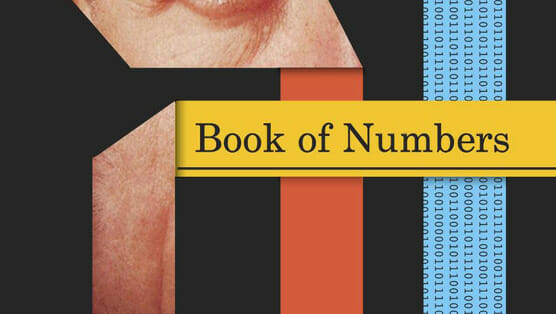Book of Numbers by Joshua Cohen

The core story of Book of Numbers is of two different characters named Joshua Cohen: one a struggling writer and one a beyond-eccentric billionaire tech genius.
 The larger aim of Cohen’s work—and the reason for the book’s sprawl, with no digression too minor to explore—is a State of the Modern World, an attempt to reconcile the human history and traditions that stretch across thousands of years with the on-demand, hyper-connectivity of our current online lives. The notions of searching and finding, as they’ve transformed from an ancient religious ideal to the rote, keyword-typed-in-a-box meaning of today, seem especially troubling to Cohen.
The larger aim of Cohen’s work—and the reason for the book’s sprawl, with no digression too minor to explore—is a State of the Modern World, an attempt to reconcile the human history and traditions that stretch across thousands of years with the on-demand, hyper-connectivity of our current online lives. The notions of searching and finding, as they’ve transformed from an ancient religious ideal to the rote, keyword-typed-in-a-box meaning of today, seem especially troubling to Cohen.
The novel opens with the line, “If you’re reading this on a screen, fuck off. I’ll only talk if I’m gripped with both hands.” It comes from the perspective of the narrator Cohen, but it’s no accident that the author Cohen places his most provocative line at the top of his work.
Cohen the narrator is a writer, a novelist whose long-researched and potential masterpiece about his mother escaping the Nazis in World War II Poland was forgotten the day after it appeared, the world’s attention grabbed by the September 11, 2001 terrorist attacks. The narrator’s good friend then goes on to publish a bestseller tracking a hijacker’s route and writing from the battlefields of Afghanistan, a source of unending jealousy.
Then a job offer comes, and Cohen the narrator is given the top-secret task of ghostwriting the biography of another Joshua Cohen, founder of the ubiquitous tech/search company Tetration. In the narrator’s words, “The man whose business has ruined my business, whose pleasure has ruined my pleasure, whose name has obliviated my own.”
-

-

-

-

-

-

-

-

-

-

-

-

-

-

-

-

-

-

-

-

-

-

-

-

-

-

-

-

-

-

-

-

-

-

-

-

-

-

-

-








































